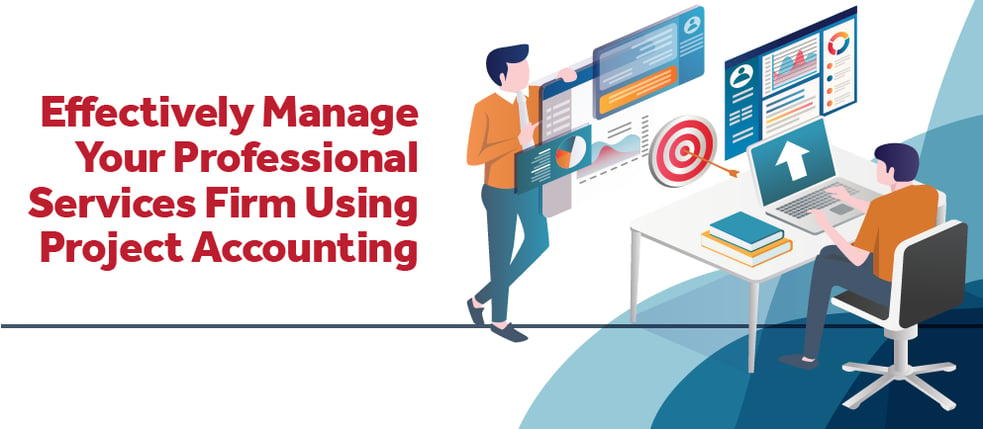Effectively Manage Your Professional Services Firm Using Project Accounting

When thinking about standard business accounting – what automatically comes to mind? Income statements, balance sheets, departmental budgets, and the various aspects that make up those statements – right? These figures are, of course, very important to know and understand. But that is only part of the whole picture of the health of your professional services firm. How does your firm go about determining how those figures came to be, which projects were profitable, which weren’t, and why? These questions, and many more, can be answered by implementing project accounting for your firm.
First, What is Project Accounting?
Let’s start by comparing it to standard accounting, which most of us know. Standard accounting manages the financials using a company’s organizational structure – how divisions or departments track things like their G&A, labor, etc. compared to their budgeted amounts on a periodic basis. Project accounting goes deeper and looks closely at the different projects a professional services firm has undertaken, most of which regularly cross departments and might last months or even years.
Let’s say, for example, company X wants to undergo a new green initiative in its office. Standard accounting will keep track of costs for things like the smart electronics to manage lighting and HVAC or the newly hired “Green Officer.” However, what standard accounting doesn’t do is manage the costs for the actual project, i.e. how much did it cost you to achieve your final goal.
But let’s take this a step further. Let’s say you need to provide this service to a customer – you’re going to implement that same green initiative at a client site.
Using Project Accounting, you could also manage, discover, and analyze things like:
- The amount of time dedicated by project staff and management to build and maintain the project plan, including the phases of work and project hierarchies
- Tracking of the contract budget/contract status/change orders and add-on services
- Whether you are effectively utilizing your internal resources
- Maintaining up-to-date project deadlines and the associated costs of meeting or not meeting those deadlines
- How percentage of completion is managed and tracked to budget
- If the project was budgeted correctly, and how what was learned from this project can be used to better manage projects going forward
Outgrowing Your Basic Accounting Solution?
Small professional services firms often rely on simpler accounting software solutions to manage their day-to-day business. One common example is QuickBooks. This product can often serve a company’s needs…for a while. However, these firms will soon find that they are outgrowing the software’s limited capabilities.
J. Carlton Collins, CPA details those limitations in his piece “Practical Advice for Companies That Have Outgrown QuickBooks”.
At a glance, those basic limitations can be summarized as:
- Limited accounting system features
- Limited database performance
For various reasons, the limited accounting functionality and database performance provided by these simpler software products can actually be appealing to these smaller companies initially. But at some point, growing firms will discover that they need accounting software that can grow along with their business. They will need more than limited features and performance.
Need Help While Gaining Growth?
Growth can be defined by many different metrics – for example, an increase in revenues, an increase in number of employees or customers, higher profits, and greater market share, just to name a few. Professional services firms experiencing this sort of growth will eventually need to take that step up to an accounting software solution that will provide them with both standard accounting, as well as project accounting capability.
Take, for example, this advice from Lindsay Diven, Marketing Manager at Full Sail Partners, in her article about “The Importance of Benchmarking in Measuring Business Growth”. She tells us that “by rigorously examining internal operations against recognized standards, firms can pinpoint critical deficiencies and implement strategic changes, ensuring survival and fostering growth in an ever-evolving marketplace.”
As Lindsay says, by utilizing some of the capabilities of a robust project accounting software system, you can start to:
- Identify Efficiency Gaps
- Enhance Competitive Advantage
- Drive Strategic Planning
- Improve Financial Performance
So, if your firm is expanding, and the sort of growth that we’ve identified above is important to the future of your firm, you should look to us here at Full Sail Partners to help you navigate the next step to support your firm’s growth.
Achieve Success Through Project Accounting
In the end, we are all working toward success for our professional services firm. And to most of us, success means growth – in whichever metric resonates the most with the ongoing health of your firm. So, to achieve that healthy firm growth means managing every minute, as well as every dollar, spent, through project accounting, to obtain that success.


